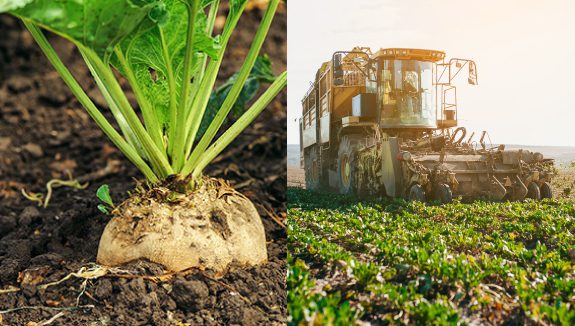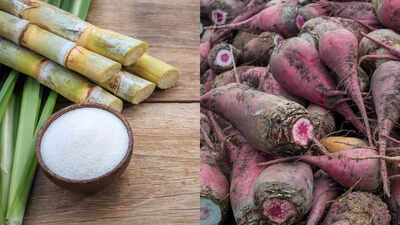Simple plan for understanding Sugar beet vs sugar cane differences
The Great Argument: Sugar Beet Vs Sugar Cane - Which Is the Superior Option for Sugar?
The dispute over sugar beet versus sugar cane as the recommended sugar entails numerous essential variables. Each offers distinctive benefits and difficulties pertaining to manufacturing, flavor, and health and wellness ramifications. While sugar beet might attract those prioritizing sustainability, sugar cane has its own social and cooking relevance. As consumers become more aware of their selections, the question stays: which sugar absolutely attracts attention in today's market?
The Beginnings of Sugar Beet and Sugar Cane
Sugar cane has been grown for thousands of years, mainly in tropical regions, sugar beet arised as a substantial option in cooler climates throughout the 18th century. Sugar cane, indigenous to Southeast Asia, was initial trained around 8000 BCE and spread out worldwide through profession and expedition. Its high sucrose material made it an important plant, resulting in comprehensive plantations in areas like the Caribbean and Brazil.
On the other hand, sugar beet was initial cultivated in the Mediterranean around the 18th century, specifically getting traction in Europe as a response to sugar cane scarcities. The plant prospers in warm climates, making it ideal for regions with chillier weather. The exploration that sugar can be removed from beet roots changed sweetener production, specifically during the Napoleonic Wars when profession constraints limited cane sugar gain access to. The surge of sugar beet cultivation marked a zero hour in the history of sugar, providing a regional resource for many countries.
Production Procedures: From Field to Sugar
The production procedures of sugar beet and sugar cane disclose significant distinctions in cultivation methods, harvesting methods, and improvement stages. Comprehending these nuances is vital for valuing just how each crop adds to the total sugar market. This contrast highlights the one-of-a-kind attributes and obstacles connected with both sources of sweet taste.

Cultivation Methods Comparison
Growing strategies for sugar beet and sugar cane expose distinct techniques that affect their production procedures, from field preparation to last sugar removal. Sugar beet farming typically involves plowing and harrowing to produce a fine seedbed, complied with by seeding in rows to help with growth. This plant take advantage of cooler climates and is commonly grown in spring. In contrast, sugar cane is usually planted in furrows with pre-sprouted cane items, calling for a cozy, exotic climate for optimal growth. Cane fields are frequently laid out to manage water efficiently, offered its need for significant watering. Both crops are handled with particular fertilization and pest control practices tailored to their growth settings, impacting return top quality and performance in sugar removal.

Harvesting Approaches Discussed
Efficient harvesting methods for sugar beet and sugar cane play an important role in guaranteeing optimal return and top quality of the end product. Sugar beet harvesting usually employs mechanical root harvesters, which successfully uproot the beets from the dirt and separate them from the vegetation. This method lessens damages to the beetroots and reduces labor expenses. On the other hand, sugar cane harvesting may use either hands-on labor or equipment, relying on the area and range of manufacturing. Mechanical harvesters reduced the cane at the base and usually strip away the leaves, enhancing the process for bigger fields. Both approaches need mindful timing to assure the crops are collected at peak sweetness, influencing the high quality of the last sugar item.
Refinement Process Differences
While both sugar beet and sugar cane undertake rigorous improvement processes to transform their raw kinds right into usable sweeteners, the approaches utilized differ significantly. Sugar beet improvement begins with washing and cutting the beetroots into slim cossettes, adhered to by diffusion, where warm water removes sucrose. The resulting juice is after that detoxified, focused, and crystallized. In contrast, sugar cane processing includes crushing the stalks to extract juice, which is after that cleared up making use of lime and warmth to remove impurities. The cane juice is evaporated to develop syrup prior to formation. Inevitably, while both procedures aim to produce white sugar, the distinct strategies highlight the one-of-a-kind characteristics of each resource and their ramifications for flavor and purity in the last item.
Nutritional Profiles: What's in Your Sugar?
The dietary accounts of sugar beet and sugar cane existing distinct distinctions worth checking out. This contrast includes elements such as caloric content, mineral and vitamin presence, and variations in glycemic index. Comprehending these elements can give understandings right into exactly how each sweetener may impact general wellness.
Calorie Content Comparison
Understanding the calorie material of sugar beet and sugar cane is vital for those mindful of their dietary options. Both sugar largely are composed of sucrose, adding a similar calorie worth. Usually, sugar beet includes approximately 387 calories per 100 grams, while sugar cane has regarding 390 calories per the same quantity. The mild distinction in caloric material might not substantially impact most diet regimens; nevertheless, it is amazing for those carefully monitoring their caloric consumption. Additionally, both sugar sources offer energy but do not have essential nutrients, making them mainly sources of empty calories. Consequently, people looking for healthier options may wish to consider these elements when picking in between sugar beet and sugar cane as their preferred sweetener.

Mineral and Vitamin Material
Calorie content gives only a component of the image when evaluating sugar beet and sugar cane. Both resources of sugar differ markedly in their mineral and vitamin profiles. Sugar beets are incredibly rich in necessary nutrients, including potassium, magnesium, and iron. They additionally consist of small amounts of vitamins such as B6 and folate, adding to their nutritional value. On the other hand, sugar cane supplies a different collection of advantages, consisting of calcium, phosphorus, and traces of B vitamins. While neither option is a substantial source of minerals and vitamins compared to entire foods, sugar beetroots may have a mild side due to their higher mineral web content. Inevitably, consumers seeking nutritional take advantage of sugar need to take into consideration these distinctions in accounts.
Glycemic Index Differences
Glycemic index plays a crucial duty in evaluating just how different sweeteners influence blood sugar levels. Sugar beet and sugar cane show noteworthy distinctions in their glycemic feedbacks. Typically, sugar beet has a reduced glycemic index contrasted to sugar cane, leading to a slower and steadier surge in blood sugar degrees after usage. This quality might make sugar beet a more suitable choice for people taking care of diabetes or those looking for to preserve stable power levels. On the other hand, sugar cane tends to create a more rapid spike in blood sugar, which might lead to quicker energy collisions. Recognizing these distinctions is considerable for consumers intending to make educated dietary selections pertaining to sugar and their effect on overall wellness.
Environmental Impact: Sustainability Factors To Consider
While both sugar beet and sugar cane are crucial resources of sugar, their environmental influences and sustainability considerations vary substantially. Sugar beetroots, click here to read primarily expanded in warm areas, normally require much less water and can be cultivated in varied climates. They additionally benefit from plant rotation techniques, which improve dirt health and wellness and lower the requirement for artificial fertilizers. Extensive farming of sugar beets can lead to dirt depletion and chemical usage.
On the other hand, sugar cane grows in tropical environments and frequently demands significant water resources for watering (Sugar beet vs sugar cane). The monoculture nature of sugar cane farming can intensify dirt disintegration and biodiversity loss. Additionally, the burning of cane areas prior to harvest releases carbon discharges and adds to air pollution. Both crops encounter challenges associated to environment change, however their varying cultivation practices exceptionally affect their overall sustainability accounts. For that reason, the option in between sugar beet and sugar cane involves weighing these environmental effects carefully
Taste and Culinary Utilizes: Which Sugar Reigns Supreme?
The selection in between sugar beet and sugar cane expands past environmental considerations to include taste and culinary applications. Sugar beet, reference usually perceived as having a slightly different flavor profile, has a tendency to be less pleasant than sugar cane. This refined difference can influence its usage in dishes, particularly in baked goods where a neutral sweetness is preferred.
On the other hand, sugar cane is commemorated for its unique, abundant, and extra intricate flavor, making it a preferred choice for beverages and desserts - Sugar beet vs sugar cane. Its natural molasses material can improve the deepness of flavors in numerous dishes
In cooking, sugar cane's adaptability beams via in sauces, lusters, and confections, while sugar beet is frequently discovered in processed foods and sweeteners like granulated sugar. Eventually, the choice between both sugar usually hinges on private taste choices and details cooking applications, with each offering one-of-a-kind advantages in the cooking area.
Wellness Effects: Sugar Beet Vs Sugar Cane
Both sugar beet and sugar cane have distinct health and wellness ramifications that can influence consumer selections. Sugar beet vs sugar cane. Sugar beet is usually pertained to for its greater fiber content, which can assist digestive wellness. Furthermore, it contains particular antioxidants that might add to overall health. On the other hand, sugar cane is rich in nutrients such as calcium, potassium, and magnesium, supplying some mineral benefits
However, both resources mostly consist of sucrose, which can lead to comparable health and wellness issues when eaten exceedingly, such as weight problems, diabetes, and cardiovascular disease. The handling approaches likewise vary; sugar beet is usually improved much more intensively, possibly resulting in a loss of specific nutrients. Customers concerned concerning additives might choose sugar cane, as it often goes through less handling. Ultimately, understanding these health and wellness implications can assist individuals toward making educated choices concerning their sweetener selections.
Consumer Preferences: Patterns and Insights
Customer preferences for sugar have actually evolved substantially in the last few years, affected by wellness trends, environmental worries, and dietary options. Increased understanding of the adverse health and wellness impacts related to extreme sugar intake has led many consumers to look for alternatives. This shift has motivated an expanding interest in natural sugar, with sugar beet and sugar cane going to the forefront of discussions.
Research suggests that customers are significantly preferring sugar beet as a result of its perceived environmental advantages, as it is usually expanded closer to processing plants, decreasing transportation discharges. On the other hand, sugar cane over here is commonly linked with exotic regions and may carry perceptions of sustainability challenges.

Frequently Asked Inquiries
Just How Do Sugar Beet and Sugar Cane Affect Blood Glucose Levels?
Sugar beet and sugar cane both contain sucrose, which can boost blood glucose levels. The influence mainly depends on individual metabolic rate and usage amounts, however both sources add likewise to blood glucose feedbacks in many cases.
Which Sugar Is Better for Cooking and Cooking?
When reviewing sweeteners for cooking and cooking, one must take into consideration texture, taste, and moisture retention. Sugar beet and sugar cane both supply special qualities, with sugar cane usually liked for its richer flavor account in culinary applications.
Can Sugar Beet or Cane Be Utilized in Vegan Diets?
Both sugar beet and sugar cane can be used in vegan diet plans. They are plant-derived sugar, making them appropriate for people seeking vegan-friendly alternatives without animal items, making sure ethical options in their cooking practices.
What Are the Historic Uses Sugar Beet and Cane?
Historically, sugar beet and cane acted as crucial sources of sweet taste, with cane grown in tropical regions and beet in pleasant zones. Both have actually been integral to numerous cultures, economic situations, and culinary practices throughout history.
Exist Any Alternatives to Sugar Beet and Cane?
Alternatives to sugar beet and cane consist of agave nectar, honey, syrup, and sweetening agents like aspartame and sucralose. These alternatives supply varying tastes and wellness benefits, attracting varied dietary choices and limitations.